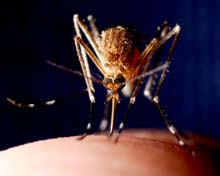New Mosquito Bite Study Reveals Bad News for Beer Drinkers
How to NOT Experience Bug Bite Increase of Over 34.5%
by www.SixWise.com
If kicking back outdoors with an ice cold brewski in your hand is your idea of a good time, take note: a new study by Australian researchers found that beer drinkers attract more mosquitoes than teetotalers.
|

Though researchers have no idea why, beer drinkers are a preferred target for mosquitoes!
|
In fact, during the carefully controlled study, 34.5 percent more mosquitoes were drawn toward men who had just finished drinking a liter of beer, compared to those before having a beer.
The findings have obvious implications for those who enjoy drinking a few beers while outdoors fishing, barbecuing or just relaxing … you may become the preferred target for these pesky, and potentially disease-carrying, pests.
In addition to beer drinking, other reasons you are more likely to be bitten include:
- If you have smelly feet
- Women who are ovulating
- Blonds (more than Brunettes)
- When you or neighbors allow standing water around your home
WARNING: In visiting developing countries, where malaria is prevalent, the implications could be downright deadly.
Drinking Beer may Increase Malaria Risk
Every year, 300 million to 500 million cases of malaria occur worldwide, according to the CDC, and over 1 million people die, mostly young children living in sub-Saharan Africa.
Don’t be Confused, Malaria is present in 48 U.S. States!
“In the United States Malaria is the most commonly imported disease”
There have been several outbreaks of malaria in United States. It’s a matter of when (not if) the next outbreak occurs.
The disease occurs when the parasites invade your red blood cells, causing a flu-like illness with high fevers and shaking chills, and if not treated immediately it can lead to coma, kidney failure, and death. Though symptoms typically arise 10 days to four weeks after infection, it can take up to a year for a person to feel sick while continuing to be a malaria carrier.
According to the latest research, because beer is a popular beverage in developing countries such as West Africa, where malaria rates are highest, it could be having a significant impact on malaria risk.
“The alcoholic beverage used in this experiment is a very popular drink in West Africa. Therefore, the increased attractiveness following beer consumption found here raises crucial issues regarding strategic planning for malaria control … These results suggest that beer consumption is a risk factor for malaria and needs to be integrated into public health policies for the design of control measures,” the researchers wrote.
Malaria is most common in developing countries, particularly Africa where a child dies from malaria every 30 seconds, but anopheles mosquitoes -- the only genus of mosquito that's capable of transmitting the malaria virus -- are also found in the United States.
"About 1,300 cases of malaria are diagnosed in the United States each year. The vast majority of cases in the United States are in travelers and immigrants returning from malaria-risk areas, many from sub-Saharan Africa and South Aisa," says the Centers for Disease Control and Prevention.
In fact, although malaria itself has been eradicated in the United States since the early 1950s, the two species of anopheles mosquitoes that were largely responsible for U.S. malaria cases prior to eradication are still widely prevalent. Because of this, there is always a risk of malaria being reintroduced in the United States.
For instance, the CDC reports that between 1957 and 2003, 63 malaria outbreaks of locally transmitted mosquito-borne malaria occurred in the United States.
Why and Where ELSE Should You Avoid Mosquito Bites Like the Plague? In Your Backyard!
|

If you’re bitten by a mosquito infected with malaria or West Nile Virus in the U.S., the disease can enter your bloodstream and quickly multiply.
|
Mosquitoes are more than just an annoyance when you’re trying to enjoy a family picnic; they can transmit serious diseases, even above and beyond malaria.
For instance, throughout the United States mosquitoes can carry West Nile Virus (WNV), an infectious disease that first appeared in the United States in 1999 and since then “more than 1.5 Million people have been infected” (according to the CDC’s Dr. Lyle Peterson, who was seriously infected himself). Well over 300,000 of these cases have involved West Nile Fever, which has appeared in all contiguous 48 states. About one in 150 people bitten will develop a serious case that can at times be life threatening.
Dramatic Outbreak up from 4,000 last year in NY to 114,000 Already this Year!
Everywhere Including Western US States:
While this Newscast recommends DEET, read about DEET Health Warnings below.
When bitten by an infected mosquito (the mosquitoes often transport infected blood from having bitten infected birds, deer, or visitors from outside the US, etc.), West Nile Virus can enter your bloodstream and multiply, where it then moves on to your brain, crossing the blood-brain barrier and causing brain tissues to become inflamed.
With more and more vacant homes with their swimming pools becoming breeding grounds, what was a concern in past years is approaching the threat of a “plague outbreak” could occur this year.
Mosquitoes increasing from Home Foreclosures (Newscast):
In past years most cases of WNV (about 80 percent) were not serious and most who become sick recovered fully. However, in about 1 percent of cases (or less) a serious, life-threatening illness can develop. In severe cases, WNV symptoms include headache, high fever, stiff neck, disorientation, muscle weakness, tremors and permanent paralysis, so if you notice these symptoms about two to 15 days after being bit by a mosquito, see a health care practitioner right away.
Deaths from West Nile in Oklahoma (victims in 18 counties)
People over 50 and those with weakened immune systems are at highest risk of developing a serious case of West Nile Virus.
Further, in another 20 percent of those who become infected, symptoms such as fever, headache, and body aches, nausea, vomiting, and sometimes swollen lymph glands or a skin rash on the chest, stomach and back may develop. These symptoms may last anywhere from a few days to several weeks.
You’re most likely to get WNV when mosquito populations are most active, which is during the warm, summer months in the United States.
When and Why are Mosquitoes Most Likely to Bite …
Mosquitoes bite to feed. After landing on your skin, they insert their sharp, thin mouthpart called a proboscis into you and suck your blood into their abdomen. Only female mosquitoes bite people (males feed on plant juices), and their saliva contains anticoagulant proteins that prevent your blood from clotting and make it easier for them to feed.
How are mosquitoes attracted to humans? When you exhale, the carbon dioxide you breathe out can attract a mosquito up to 35 meters away. Once they get into close range, body odor, sweat and likely a combination of other odors produced by skin microflora play a role in attracting the mosquito.
Anyone can be bitten by a mosquito, but if you’re a beer drinker, keep in mind your risk may be higher than average. Along with beer drinking, other factors have also been identified that increase your risk of becoming a target. These include:
- Movement (moving targets may attract more mosquitoes)
- Wearing perfume
- Eating Limburger cheese
After a mosquito bites you, some saliva remains in the wound, causing an immune response to occur. The bite will typically swell and itch until your immune system can break down the saliva. Again, there is also the risk that mosquitoes can transmit West Nile Virus and, though not common in the United States, dengue fever, yellow fever and malaria.
How to Reduce Your Risk of Becoming Mosquito Bait
|

You can enjoy your outdoor activities sans mosquitoes by misting the area, your skin and clothing with all-natural and safe Lice B Gone first!
|
If you're going to spend time outdoors, wearing long pants, socks and long sleeves, plus don’t wear perfume or colognes which attract misquotes are some ways to prevent mosquito bites. Placing a large fan on your patio or deck is another low-tech solution, as the airflow will make it difficult for mosquitoes to hover and land on you, as they are weak fliers..
However, mosquitoes can bite through thin material, so it’s a good idea to spray a “chemical-free NON-TOXIC repellant” on them if you can find one. Look for a non-toxic insect repellant variety that doesn't contain DEET to spray on the outside of your clothes and on any exposed skin as well.
HEALTH WARNING: Why DEET is NOT a Good Choice… in direct contrast to what the Media is Telling You, Doesn’t Want You to Know! And Why!
Your first instinct to get rid of pests may be to purchase a strong insecticide to spray around your yard, home or on your body. As in most above Newscasts MOST News Media promotes using DEET which is scary as either because they don’t know the facts or they don’t know any non-toxic alternatives. However, the fact is that pesticides can be extremely hazardous, as can DEET, the active ingredient in most insect repellants.
In fact, studies conducted at Duke University have found that using DEET frequently or for extended periods may damage your brain cells, resulting in:
- Memory loss
- Headache
- Weakness and fatigue
- Muscle and joint pain
- Tremors
- Shortness of breath
While the EPA maintains that the chemical is safe when used correctly, studies have shown that when DEET is used in high amounts, or for long periods of time, DEET is far from safe.
According to studies by Mohamed Abou-Dania, a professor at Duke University, while lab rats had no reaction to DEET when it was used for 30 days, after 60 days their brain cells started to die. This chemical (DEET) has also been shown to cause nervous-system damage, including:
- Insomnia
- Mood changes
- Disorientation and clumsiness when walking
- Seizures
- Coma
- Even death
It may take months or years for such symptoms to develop, making it difficult to establish DEET as the cause, Abou-Donia said.
"The take home message is to be safe and cautious when using insecticides," Abou-Donia told DukeHealth.org. "Never use insect repellents on infants, and be wary of using them on children in general. Never combine insecticides with each other or use them with other medications. Even so simple a drug as an antihistamine could interact with DEET to cause toxic side effects. Don't spray your yard for bugs and then take medications. Until we have more data on potential interactions in humans, safe is better than sorry."
Adding to the problem is the fact that DEET does not degrade quickly, nor does it breakdown much as it passes through sewage or drinking-water treatment plants.
Scientists are worried that DEET may collect in the sediment of streams and prove toxic to birds, fish and other wildlife.
The Best, Safe, All Natural Mosquito Repellant You’ve Probably Never Heard Of that in no way sounds like a “Mosquito Repellant” but works better and is much better for your health!
You and your family can safely repel all kinds of insects naturally, with no health risk and no toxic chemicals, by using all-natural Lice B Gone. Don’t let the name fool you (like it fooled us too at first) … it’s effective against much more than just head lice and can control in-home pests including ants, bees, flies, mosquitoes, gnats and more.
This gem of a product is not widely known or heavily marketed because it is manufactured by a small natural business in southern Illinois. The scientific developer was holistically focused on the health and well-being of our children first and foremost, so he developed both Lice B Gone and Flea ‘n Tick B Gone, which safely removes fleas and ticks from pets (and also doubles as a safe insect repellant for other pests, too).
Lice B Gone is an ideal alternative to DEET-containing repellants because it's an enzyme-based formula made naturally from plant resources “without” the heavy toxic DEET chemical smell or related health concerns for you, your family and friends.
It is even safe enough to spray-mist directly onto your skin, plus, you can use it as an entirely non-toxic insect repellant for your backyard, home or picnic area. Just mist the area or your skin and you're tick- and bug-free for about three hours!
Remember, the unique all natural non-toxic “Lice B Gone” effective bug and mosquito replant is a proprietary blend of water and non-bacterial enzymes (amylase, cellulase, lipase, protease) from plant origin. It is biodegradable and ecologically harmless to aquatic, plant and animal life … including you and your family!
Finally, keep in mind these three final mosquito-busting tips to keep your outdoor summer activities as pest- and bite-free as possible:
- Dusk and dawn are peak mosquito hours, so take extra precautions during these times.
- Since mosquitoes lay eggs in standing water, you can reduce the number of mosquitoes around your home by eliminating any standing water (flower pots, birdbaths, pet water dishes, barrels and more can all be culprits).
- You can keep mosquitoes out of your home by installing tight-fitting screens into all your windows and doors (and repairing any holes in existing ones).

SixWise Says ...
Did you know that like the fragrance of your favorite food or the smell of food you dislike, mosquitoes too pick up the scent of people that smell tasty and those that don’t? This is why some get bit and some don’t. Are you just too tasty to pass up?
Also have you ever wondered how dead bugs get into closed light fixtures? That drives some people crazy, especially those who never get bit … while it can make those who do get bit feel that there is some justice for such creatures they never saw bite them, which I guess provides a sort of momentary comic relief for those who are very tasty.
My software never has bugs. It just develops random features.
Recommended Reading
The Deadliest Animal on Earth: A Short and Important Overview
Warning: “Worst Mosquito Season in Two Decades" Predicted
Sources
PLoS One. 2010 Mar 4;5(3):e9546.
TorontoSun.com April 30, 2010
Centers for Disease Control and Prevention: Malaria
DukeHealth.org January 10, 2007
DukeHealth.org May 1, 2002
American Mosquito Control Association
National Geographic Video
KOATTV Video